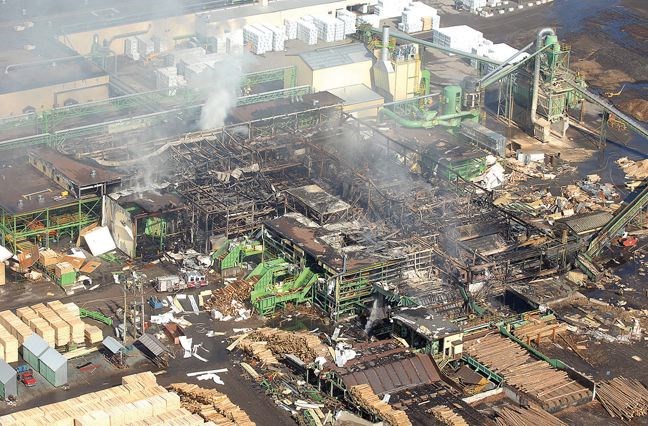 The déjà vu Criminal Justice Branch report Monday on why again no charges will be laid in another mill explosion put enormous pressure on the government to shake up WorkSafe B.C. and force improvements in its accident investigations.
The déjà vu Criminal Justice Branch report Monday on why again no charges will be laid in another mill explosion put enormous pressure on the government to shake up WorkSafe B.C. and force improvements in its accident investigations.
For the second time in four months, the CJB reviewed a WorkSafe report on a fatal accident and concluded there isn’t enough evidence to lay charges. It would be easier to take if Crown counsel were reviewing impeccable reports that looked at all the evidence and simply didn’t make a legal case.
But in both cases, the Criminal Justice Branch is saying that WorkSafe came up short in its investigations into the deaths of four people, and the serious injuries to 42 others.
There were two almost-identical accidents, three months apart. The Babine Forest Products mill in Burns Lake exploded and burned in January 2012, leaving two dead and a score injured. Three months later, the Lakeland mill in Prince George exploded in April, killing two and injuring 22.
WorkSafe submitted two separate reports to the Criminal Justice Branch. The branch on Monday arrived at the same conclusion in the Lakeland case as it did earlier in the Babine case. No charges will be laid, because there is no substantial likelihood of conviction. It’s partly because the mill managers can prove due diligence in handling the sawdust, the cause of both explosions. And it’s partly because of deficiencies in the investigations themselves.
The Criminal Justice Branch also had a few pointed remarks about how it sees its job when handling highly publicized, politically sensitive cases. Which is: the same way it handles every other case. The reminder seems to be in response to the controversy that arose after the first no-charges decision.
It prompted a review by Premier Christy Clark’s office and a concerted campaign by Opposition New Democrats for a public inquiry into every aspect of the mill explosion and how it was handled by government agencies.
The CJB took pains to note it has a responsibility to explain itself. “This includes identifying evidentiary difficulties that have factored into the charging decision.”
“The branch appreciates that the decision not to charge will have a significant impact on … the families, friends and colleagues of workers who were killed or injured.”
WorkSafe recommended four charges under provincial safety law, but no criminal-negligence charges.
“As was the case with the Babine charge assessment, Crown counsel ultimately concluded that the manner in which WSBC conducted parts of its examination of the Lakeland mill site would likely render some evidence that it gathered … inadmissible in court.”
That wasn’t the sole reason not to proceed. But it’s enough to make anyone wonder about WorkSafe’s approach to major accident investigations.
No search warrants were requested, so some evidence can’t be used. Major case methodology wasn’t used and “a number of areas of potentially relevant evidence were left unexplored.”
Those included direct evidence about who knew what about sawdust conditions and explosion dangers.
But even if the investigation had been first-rate, Crown counsel say Lakeland had a sturdy defence. It showed due diligence on dust issues and was in compliance at the time.
The B.C. government has been working on an answer to the extraordinary set of circumstances for months. It wants WorkSafe fixed, but it wants the fix accomplished without a lengthy, expensive public inquiry. Labour Minister Shirley Bond unveiled the response Monday. Veteran former deputy minister Gord Macatee will step aside from the B.C. Ferry Commission and take charge of reforming WorkSafe and finding a new boss to run it properly. He’ll follow a plan outlined by Clark’s deputy, John Dyble, when he reviewed the first report into the Burns Lake disaster.
As for independent public scrutiny, there’ll be an inquest or inquests. The chief coroner may roll both into one.
The government has been vague on how it views WorkSafe. But Bond’s to-do list for Macatee clears things up. The first item is to “ensure future investigations are handled correctly.”
That’s a remarkably embarrassing order to have to give to an agency with such important responsibility.



